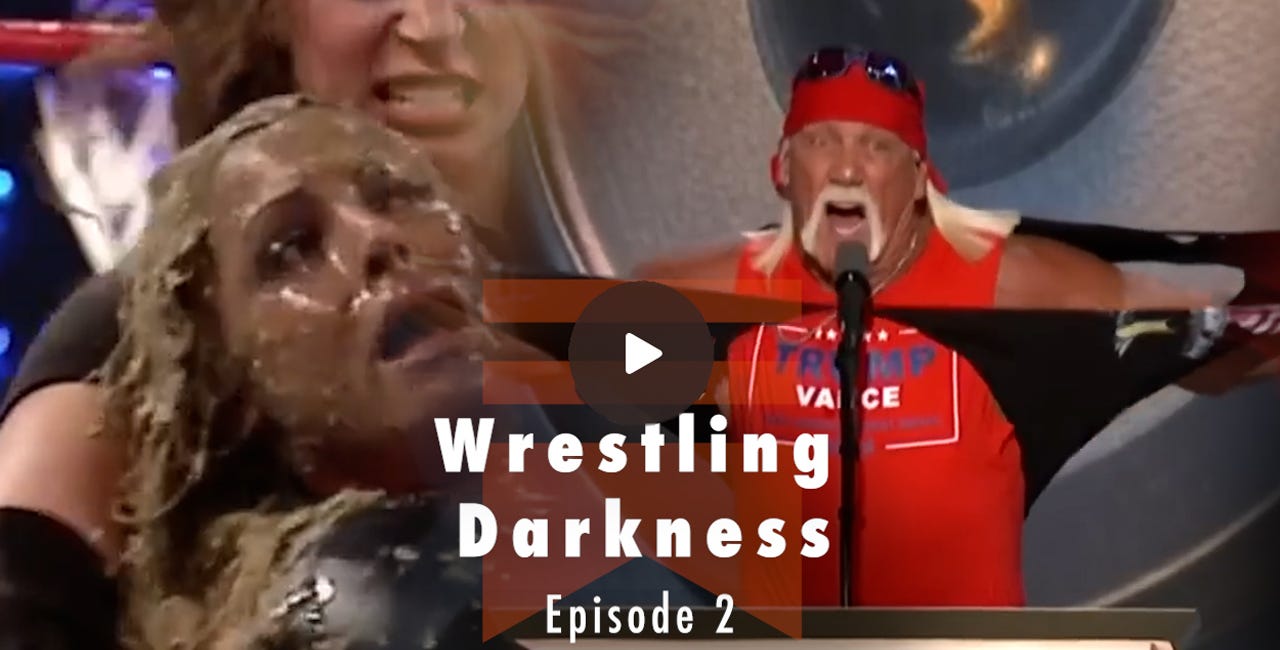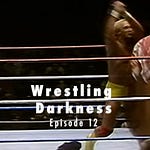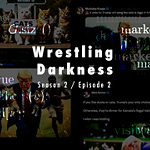When we buy a ticket to see a movie or a play, the worst that can happen is we’ll be bored, or disappointed, or we won’t be able to maintain our suspension of disbelief. As viewers, we do all we can to believe in worlds of make believe, and in return we get escapism, catharsis, a good cry, a laugh, or a scare.
But what happens when the form of entertainment to which we have committed ourselves follows us into our communities and our homes? What if there’s no escape from the escapism? And what if the consequences are life and death on a global scale?
It seems the people best equipped to navigate politics in America today are wrestling performers, their followers, and their ringmasters. Donald Trump and Jon Stewart certainly understand the game. Vladimir Putin and Volodymyr Zelenskyy do too.
Trumpian politics, like wrestling, is a never-ending parade of ruptures and realignments. When you have the power, the money, and the skill to decide for your audience who to hate and why, you have the power to transform a narrative, or summon a mob.
Stewart’s breakdown of the infamous Oval Office debacle was both hilarious and tragic. He didn’t even need to mention Trump’s meteoric success as a professional wrestling performer 18 years ago, nor his shift to two important derivatives of wrestling theatricality: reality TV and cable news. His success on The Apprentice depended on the illusion that he had been successful as a businessman. His success as a cable news personality derived solely from his shameless depiction of a deranged bigot fixated on Barack Obama’s birth certificate.
Most people I know think wrestling is for fools, not to be studied or considered beyond a cheap insult or a punchline. But the joke is on us, if a deeper understanding of wrestling parlance and culture eludes us for any longer.
While season one of Wrestling Darkness examines how and why we came to live in the world pro wrestling created, Season 2 kicks off with an introduction to some of the most famous plot twists in wrestling history as a prism through which to see, yes, Trump and J.D. Vance’s tag team debacle in the Oval Office, but also other political performances that are otherwise incomprehensible.
Wrestling’s leading scholar Dr Sharon Mazer joins us once again from New Zealand along with author and journalist Sarah Kurchak who joins us from Toronto.
In her forthcoming essay, Dr Mazer grapples with the stubborn illusion of the theatrical as it applies to wrestling, politics, and humanity’s uncertain future.
Below are three relevant episodes from Season 1 of Wrestling Darkness:
Episode 2: Wrestling Has Infected Everything
Abraham Josephine Riesman, author of the best-selling biography Ringmaster: Vince McMahon and the Unmaking of America., explains how the production of cheap, addictive entertainment such as pro wrestling, cable news, and reality TV, changed the culture of American.
Wrestling Darkness 4: Age of the Fantasist
My guest in episode 4 of Wrestling Darkness is Professor Lawrence Lessig who explains in his essay, The Age of the Fantasist, how and why algorithmic media came to reward narratives that lie to us.
Ep. 5: Why wrestling fans boo Hulk Hogan
Boos and screams of “Nobody cares!” and “f***ing bullshit!” drowned out Hulk Hogan's pitch for his homophobic beer brand. Why are today's wrestling fans so sick of yesterday's hero, and what might it mean for America's future?
To support Wrestling Darkness and other content on the Eric Byler Substack feed, please subscribe or make a tax deductible donation.















